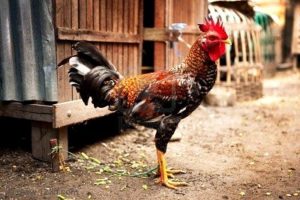News
BN Prose: Olembe’s Last Christmas by Gbenga Awomodu
On that night of April 1997, rain pelted the corrugated roofing sheet like the frenzied drumbeats of village drummers who entertained guests at the coronation of a new king. As the thunder clapped far above the sky, starting out as a distant guffaw, but ending in a deafening nearby blast, the first of the dozen eggs cracked under intense heat and Mother Hen’s light weight. For twenty-one days, she had only come out of the coop from her back-corner lodge two times every day; in the early hours of the day before most people could observe how emaciated she had become, and in the cool of the evening, just before sunset, when the playful kids had gone on errands for their parents. Occasionally, she came out an additional time at noon when the same kids had gone to school and the adults were busy at work.
The kids would not let her rest – from the time she laid her first of the clutch, they would quietly follow her and peep through the wire gauze at the front of the cage – it stood four feet above ground with two layers, the upper one divided into three compartments while the lower was left undivided. The upper compartments served as brooding area and were lavishly bedded with shavings and had a central heating lamp, food and water. Mother Hen had created her brooding area in the back corner of the rightmost upper compartment. The kids wanted to know everything and would giggle as the brown egg hit the cushioned floor. Then, her body would begin to vibrate as she cackled; she would raise her neck as the hackles shook in tandem; she would constantly adjust her head as if to show a sense of vigilance. As soon as she took a few steps towards the entrance of her compartment, the little spies withdrew their peeping heads and excused themselves. She would then make haste and fly triumphantly above the wall of the compound onto the street. The wall stood about five feet tall.
The kids continued to count while she laid her eggs and as soon as they were a dozen, she refused to lay more eggs! It was time to brood over the clutch. Brooding was a long and lonely journey because she hardly ate anything and even avoided other members of the poultry family, and human beings too. She sat there in the sawdust everyday giving heat to her newfound hope – the eggs and what they represented. Sometimes, Jide wondered what would have been going on in her mind, if she had been a human being. Now, he could not change the sawdust in her compartment as often as he did for the others. He was being careful not to tamper with the eggs – that’s if at all she leaves the space for long. When she was hungry and exhausted, no thanks to the ants that soon found their way into the cage to torment her, she ran out of the corner like a demon-possessed animal with so much noise. She fluffed as if to aerate her body; then she shook away the heavy dust and foreign bodies.
The night they first broke out of their shells, the chicks peeped through Mother Hen’s feathers and dodged again, like they were afraid to venture into the new world-a world of uncertainties. Every other night, they made low, chirping sounds as they relished heat from Mother Hen’s bosom. They continued to seek shelter under her wings after they strayed out for a moment, but they dared to venture out farther as the days went by. Troughs with food and water were often provided for newly hatched chicks and their mothers for the first few weeks. Thereafter, they were allowed to range freely. After the first three weeks, Jide allowed the new poultry family step out and he relocated them to a new cage he had built for them from used planks from a carpenter’s shop. Here in the new coop, they did not have to fly up because they occupied the lowest of the three layers. Mother Hen would guard her dozen chicks with jealousy and fierceness. Any human being who walked too close to the chicks and their mother got a loud grumble from her and sometimes, it ended in a hot chase. She shuddered and squawked in fright whenever a bird hovered above the compound. Vultures were unwanted; they are public enemies in the world of chickens.
***
During the summer of 1998, a new champion rose up the pecking order in the poultry community. He was named Olembe by the kids in the compound, after René Salomon Olembé-Olembé, the Cameroonian who played for Cameroon at the World Cup in France that June. The Cameroonian football team loved to wear tight-fitting jerseys – body hugs and very tight shorts that grabbed their crotches with so much intensity. Olembe, the rooster, was a crossbreed of an Old English game rooster and a Plymouth Barred Rock hen and he stood out for his tight feathers and very light plumage. The only surviving offspring from Mother Hen’s clutch of April 1997, Olembe was brave and fought off predators with so much tenacity and dedication. He had survived many hard times: one time it was Marek’s Disease, then Leucosis, and Fowl pox. Nutritional deficiencies also compounded the woes of the poor chickens.
When those epidemics broke out, Jide the 15-year old owner of the backyard poultry could not do much to save the lives of them birds because did not know much about diagnoses. Though he was one of the best students in the Agricultural Science class in secondary school, he did not know well enough to ascertain the exact disease. Neither could he afford the services of a qualified vet because he was a poor secondary school kid. He also thought the diseases were spread by a group of strange cockerels that had come on pilgrimage in search of new mates, all the way from Onagoruwa Street, in Somolu, three streets away. Perhaps the Marek’s Disease broke out because the poultry owner had fallen sick and could not change the sawdust for one month. He would normally trek to the Saw Mill at Ladi-Lak, some Bus-stops away from Bankole Street, in Pedro where he lived. He did this every month end, but when he fell sick for two weeks, none of his two siblings helped him out; they were both eight and nine-too young to go all alone to the Saw Mill.
The four old hens and seven pullets would cluck in the name of love at the sight of cockerels. The three resident roosters in Jide’s compound at No. 9 Bankole Street fought hard to resist the intruding cockerels and roosters from neighbouring streets and compounds. When Olembe joined the list of Roosters in 1999, he guarded his harem with much jealousy. Olembe shone in the matted black and white plumage pattern reminiscent of a neatly woven (raffia) mat. He often appeared just as the visiting cockerels made their chase and did a mating dance in an anticlockwise direction whilst spreading their wings like a Japanese hand fan and scraping the floor with feathers before mounting their mates. Cock fights were a delight to watch and some of those duels were quite bloody. Whilst some cockerels were stubborn enough to pull a fight with rivals, others, weaklings, took a flight in fright, making a lazy noise.
Olembe was never the one to leave such battle grounds crest-fallen, even though he sustained bloodied patches along the serrated edges on the comb as well as the wattles a few times. He was fearless and fierce in challenge, becoming famous because he was the only one who dared to face Booskie, the mad dog that tormented the chickens in the vicinity. Booskie, the rabid dog would chase the chickens for fun, and the chase was hotter on days Kasim the meatseller failed to come sell at No. 9. Olembe seemed to have the power of a dozen cockerels. Three of his siblings had been lost to rat invasion, another two were taken away by Newcastle disease, and then another three died in car accidents on Igi Olugbin Road, while one was killed by a rat trap. The last two just disappeared never to be seen again. Olembe the dogged dog-fighter was one of the few who survived the epidemics that took the lives of the bulk of the poultry farm, including every other member of Mother Hen’s clutch of April 1997.
In the year 2000, Olembe was apprehended and tied to the stakes, and he must have wondered what his offence was this time around for he had not nibbled at Mama Ikenna’s Ugwu leaves, neither had he pecked any hole in her yam tubers; her loaves of bread for sale were all safe. The children from the compound had committed atrocities in the past, fiddling with mother hen’s behind and trying to figure out how the egg came out from the tiny hole, but what did they have in mind for Olembe this time around?
***
That fateful harmattan day, in the haze of the early morning, the kids in the block suddenly ran with glee and excitement in their eyes into the backyard. They giggled as they trooped into the backyard. Suddenly, they all, five of them, focused on Olembe and, Mutiu, the youngest of them spread out his arms, arched out, and faced Olembe who was standing near one of the older hens, like a guard protecting her from the intruding cockerels from neighbouring compounds. The boy dove, in a flash, towards Olembe and the frenzied chase began as the old cockerel struggled to dodge the small hunters for another minute before he was pinned to the wall at one of the four corners of the rectangular compound.
Old age had caught up with Olembe like grey hair; his legs would not transport him as swiftly as they did in the good old days – the days when he fought Booskie, the rabid dog that tormented chickens in the environs at the beginning of the new millennium. Perhaps, it was just one of those games again. The playful kids did this quite often to random chickens to prove their mettle and simply have fun. Sometimes, they would just go on and on examining the different parts of a fowl’s body: the beak, the comb and wattles, the claws and toes, the feathers and regions around the wings. They would feel the pulse of the creature and touch the hot armpit behind the wings, where heat is manufactured for warmth. Usually, after the examination for some minutes, the kids soon got tired and let the poor creature go. Then they went after another chicken.
But today was different! They slipped a rope made of strands from the bag of rice over Olembe’s shank and tied him to the foot of the broken water tap. An hour went by, then the next, and the next. It was that season again; when chickens would go astray; some would just disappear, never to be found again. Sometimes you thought those creatures deliberately eloped in search of greener pastures like the desperate African immigrants who swim against the tides in defiance of immigration officers across the Moroccan boarder into the waiting arms of Spain! They were often kidnapped by hungry thieves who never even asked for ransom like the popular Niger Delta militants or the desperate kidnappers in Eastern Nigeria.
The following day, Christmas day, Olembe was subjected to Baba Jide’s portable guillotine. He had committed no crime, except that he was a chicken! That was Olembe’s last Christmas, December 25th, 2000.
Photo Credit: www.123rf.com
___________________________________________________________________________________________
Gbenga Awomodu is a freelance writer and editor. He blogs at Gbenga’s Notebook!, a repository of his thoughts and other works.
























